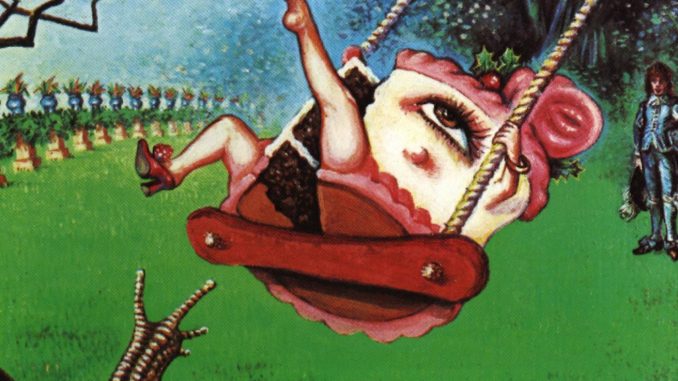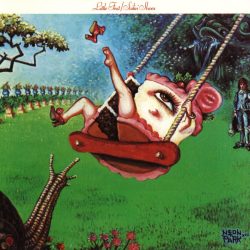
 ‘Sailin’ Shoes’ was Little Feat’s second album with the original lineup of Lowell George, Roy Estrada, Richie Hayward, and Bill Payne. The quartet’s music was among many wonderful freewheeling experiments to come out of Frank Zappa’s Southern California orbit in the late ‘60s and early ‘70s, despite the long shadow being cast by The Mothers of Invention, one of George’s and Estrada’s previous bands. Little Feat mostly escaped that shadow, thanks to the enigmatic George’s force of personality and the band’s top-level musical ability. They created their own mix of every imaginable Southern roots genre while keeping similar tongue-in-cheek wordplay and humour of The Mothers.
‘Sailin’ Shoes’ was Little Feat’s second album with the original lineup of Lowell George, Roy Estrada, Richie Hayward, and Bill Payne. The quartet’s music was among many wonderful freewheeling experiments to come out of Frank Zappa’s Southern California orbit in the late ‘60s and early ‘70s, despite the long shadow being cast by The Mothers of Invention, one of George’s and Estrada’s previous bands. Little Feat mostly escaped that shadow, thanks to the enigmatic George’s force of personality and the band’s top-level musical ability. They created their own mix of every imaginable Southern roots genre while keeping similar tongue-in-cheek wordplay and humour of The Mothers.
‘Sailin’ Shoes’ shows a continued musical evolution from Little Feat’s 1970 self-titled debut, which didn’t sell well enough to convince the Warner Brothers powers-that-be to keep the band on their label. The hook-filled single ‘Easy to Slip’ was not the immediate country-rock hit the label was hoping for either. It took the intervention of A&R man (and friend of George’s) Van Dyke Parks to convince Warner Brothers to keep the band on their roster. Their sophomore release didn’t make anyone rich or crack the charts, but Payne described the album as effectively putting them on the map, “not sales-wise, but as a group to be taken seriously.”
Like Little Feat’s debut, ‘Sailin’ Shoes’ received critical praise and went a long way to inspire a cult following. The album is a snapshot of a slimmed-down, vibrant young band, still nailing down their signature sound and on the ascent. A re-recorded version of their earlier hit ‘Willin’’ was included, with legendary Sneaky Pete Kleinow on steel guitar. Ry Cooder had played on the original version, as George had seriously injured his hand on a model airplane. The title track features George’s agile slide playing, using a slide he fashioned out of an old spark plug. George wrote most (eight out of eleven) of the tracks, while ‘Got No Shadow’ and ‘Cat Fever’ were written by Payne, who was trained as a classical pianist. ‘Cold, Cold, Cold’ and ‘Teenage Nervous Breakdown’ are raucous southern rockers with Payne’s barrelhouse piano. ‘Tripe Face Boogie’ also has a lengthy middle section where Payne really stretches out, almost going full prog-rock on the keyboard. On ‘Cold, Cold Cold’ George took a page out of his days with the Mothers of Invention, using a drum machine and Zappa’s tape editing technique.
This lineup of Little Feat broke up after ‘Sailin’ Shoes,’ one of many such splits and personnel reshufflings until George’s death in 1979 and the band’s reformation in 1988. Bassist Kenny Gradney, percussionist Sam Clayton, and guitarist Paul Barrere joined after Estrada’s departure and were on Little Feat’s next album, the New Orleans-influenced ‘Dixie Chicken.’



It’s a real shame that they only ever seemed to enjoy a ‘cult following’. True Americana legends.
A couple of years ago I found a vinyl copy of Sailin’ Shoes in a junk shop in Settle, Yorks amongst a pile of other interesting vinyl. It was filed under ‘Neon Park’. I pointed out to the shop guy that Neon Park was the cover artist. Sadly, of course, he’d never heard of Little Feat. I encouraged him to play it. Wonder if he did?
Thanks for a nice article.
A great nuanced feature, Kimberly. Like many others, I was knocked out with Little Feat’s Jan ’75 OGWT performance and became an instant fan, and spent too much of my student grant investigating their back catalogue. I still listen to them after all these years. So much promise in 1972.
Thanks, Martin. That was money well spent!
I was turned onto them when radio 1 played the live medley which includes “Tripe Face Boogie” and is on Feats Don’t Fail Me Now from 1974 and really did break them big. On that version Bill Payne really does go prog-rock and it’s none the worse for that with Lowell in blistering form on the slide.
I never saw the original line-up but I did see them twice in the 70’s. in Newcastle. The first time they were phenomenal. On the second occasion it was sad. They looked and played like a band travelling in separate limousines and when Lowell died so young it was not a surprise.